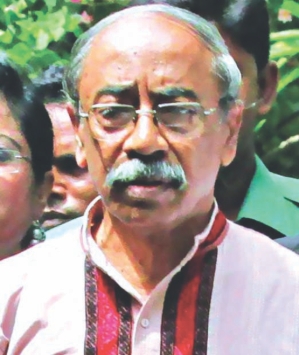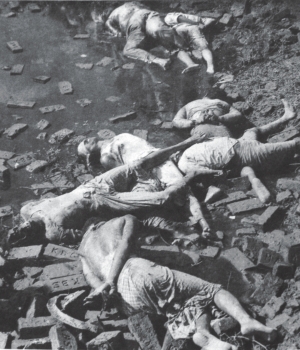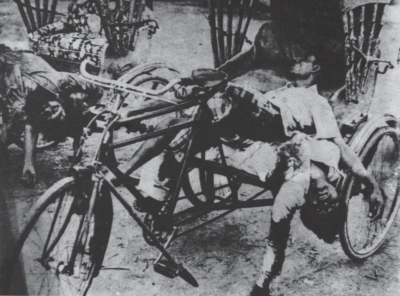| Home - Back Issues - The Team - Contact Us |
 |
| Volume 11 |Issue 35| September 07, 2012 | |
|
|
Interview Fighting Extremist Ideologies War Crimes researcher Shahriar Kabir
emphasises the need for trying the
organisations that collaborated with the
Pakistani military forces in carrying out
atrocities and genocide in Bangladesh
in 1971. In an interview with the Star he
talks about the political ideology behind Tamanna Khan
Forty years after Independence, Bangladesh finally began the trial of the collaborators and perpetrators of war crimes, crimes against humanity and genocide, committed in 1971 during the Liberation War to annihilate freedom-loving Bengalis. At present, alleged war criminals, most of whom are members of Jamaat-e-Islami, the party that assisted the Pakistani Army in carrying out such heinous crimes, are being tried at the International Crimes Tribunal, the domestic tribunal of Bangladesh formed to try perpetrators of internationally recognised crimes such as genocide. Recently while appearing as a witness of history for prosecution, Shahriar Kabir, executive president of Ghatak Dalal Nirmul Committee, appealed to the International Crimes Tribunal-2 (ICT-2) to try Jamaat-e-Islami and its associate forces for crimes against humanity committed during the Liberation War alongside its top leaders. He says that different leaders of Jamaat-e-Islami had committed the crimes not out of personal vengeance against the victims but on behalf of the party that worked as the main associate of the Pakistani occupation force and believed in the politics of killing. “Coming from a distance of 1600 km away, it was not possible for the Pakistani occupation force to conduct such a widespread, well-panned genocide, which is considered as the most horrendous genocide after the World War II. Jamaat-e-Islami have conspired, planned and carried out this genocide with the Pakistanis,” says the journalist and activist. “The Jamaat leader Khaleq Majumdar who was involved in the abduction and killing of my cousin Shahidullah Kaiser (Dr Kaiser was a renowned writer and journalist), did not have any personal enmity with him," he adds. "They were not even acquainted. This was Jamaat's political decision.” According to Kabir, the killing of the intellectuals too could not have been possible without the help of Jamaat-e-Islami. “The most important aspect of this genocide is the intellectual killing which we can refer to as elitocide, killing the elites of a nation. This could never have crossed the minds of the Pakistani Army. For practical reasons it was not possible to kill an entire nation. However if the heads of the nation could be eliminated the entire nation would become blind. It would lose its conscience; it could not move forward.” The role of Jamaat-e-Islami is well documented in Liberation War Documents as well as in Jamaat's mouthpiece, Dainik Sangram. Kabir says that statements and speeches by Jamaat leaders published in Dainik Sangram provides evidence to Jamaat's opposition to the Liberation War and incitement in carrying out the heinous crimes. Jamaat's present Ameer Motiur Rahman Nizami had said, "Every one of us should assume the role of a Muslim soldier of an Islamic state and through cooperation with the oppressed and by winning their confidence we must kill those who are hatching a conspiracy against Pakistan and Islam." (Daily Sangram, September 15, 1971) Kabir points out how Jamaat encouraged ethnic cleansing by killing Hindus. He says, rape was used as another tool of ethnic cleansing. “Lakhs of Bengali women were raped so that they would give birth to Pakistani Panjabis. Where physical elimination was not possible, people were forced out of the country. One crore people faced exodus. This is how they tried to eliminate the Bengali race,” Kabir says. The rationale for Jamaat-e-Islami's support of the Pakistani military government and their participation in war crimes, crimes against humanity and genocide, is embedded in their political philosophy, Kabir believes. Referring to Jamaat-e-Islami's founder Abul Ala Maududi, he says that Maududi was a strong supporter of Nazism and Fascism and even wrote many articles in favour of these ideologies and against democracy. "The philosophy and politics of Maududi was the 'ideological stimulation' for the commissioning of genocide in 1971. This gave the genocide legality, instigated and encouraged the party activists to carry out the genocide of 1971,” he says.
Explaining Jamaat's organisational structure, he says, “The party members followed the party's and leader's command. Jamaat-e-Islami is a party where members are bound to follow leader's instruction. This is a well-organised party. It can be compared with Stalin's communist party. It has an open leadership and an underground leadership and different hierarchies. One has to satisfy a number of selection criteria to get party membership, or to ascend to a leadership position. Not everybody can become a leader.” He adds that such a party which calls itself 'Troopers of Allah', is almost like an organised army. Kabir notes that as a political party Jamaat-e-Islami was more active in forming organisations that collaborated with the Pakistani Army, than the three other right-wing political parties of that time — Muslim League, the Pakistan Democratic Party (PDP), and Nezam-e-Islam, which had members in Shanti Committee. “However, Jamaat did not have full control over Shanti Committee and they could not use Shanti Committee as a killing squad, according to their will. Since it was not under their full command, Jamaat thus formed Rajakar, Al-Badr and Al-Shams, which will remain under their command and follow the doctrine of Maududi.” Emphasising the need of trying Jamaat's 71 fronts — Rajakar, Al-Badr and Al-Shams, he says, “Selim Khaleque, a Pakistani historian and researcher of Al-Badr, for his research work had visited Bangladesh after the Liberation War and met with Al-Badr leaders. One Al-Badr commander told him 'Pakistan Army had surrendered their arms on December 16, 1971, but we have not put down ours. Because of us the secularism in Sheikh Mujib's constitution had to be eliminated'. They are still practising this. They still believe secularism to be an ideology that opposes Islam and believe that Jihad should be conducted to kill the practitioners of secularism.” Besides, trial of organisations is nothing new in history. Kabir refers to the Nuremberg trial, which was the first systematic trial carried out by forming a law and defining the crimes and allegations and later on became a model for trying war crimes, crimes against humanity and genocide. “During the first phase of the Nuremberg trial, 24 individuals and seven organisations were tried. Those were - the leadership of the Nazi party, the Reich Cabinet (Hitler's cabinet), the Schutzstaffel (SS) (elite guard), Sicherheitsdienst (SD) (security service), the Gestapo (secret state police), the Sturmabteilung (SA) (storm troopers) and the 'General Staff and High Command' of the German armed forces. Out of the seven, four were found guilty and their organisational activity and politics were banned. Not only in Germany, the Nazi party is still banned all throughout Europe, because it was the Nazi ideology that led to the killing of about two crore people across Europe,” he says. Since Jamaat-e-Islami and its associate fronts fought against the liberation forces, Kabir opines that they can also be tried under our military law. “Muktibahini was the legal armed force of Bangladesh, as we became a sovereign nation on March 26, 1971. Therefore Al-Badr, Al-Shams and Rajakars fought against the People's Republic of Bangladesh, which was equal to treason. Therefore they can also be tried under our conventional military law,” he observes. “We have been demanding the trial of the organisations alongside individuals and asking for their ban. Because they themselves claim that they are still active. The leaders of Jamaat have not changed. Those who led Al-Badr and Chhatra Sangha(Jamaat-e-Islami's student wing), they are now the leaders of Jamaat-e-Islami. Jamaat's Ameer Motiur Rahman Nizami was the chief of Al-Badr and Jamaat's secretary general Ali Ahsan Mohammad Mojaheed headed East Pakistan wing of Al-Badr. They have not apologised for their role in 1971. The politics that legalised and justified the genocide of 1971 has not changed,” asserts Kabir. In reply to whether Jamaat-e-Islami and other religious and communal political parties should be banned, Kabir says that according to the constitution of 1972, religion cannot be used for political purpose. Secularism, being one of the pillars of the original constitution, prohibited the existence of any communal party or political party based on religion. Though secularism was shunned from the constitution through the Fifth Amendment, Kabir says that the Supreme Court verdict on July 2010 announced the 5th amendment illegal, paving the way for reinstatement of secularism in the constitution. “According to that not only Jamaat-e-Islami, all communal and religious political parties can be banned. Unfortunately, neither that principle of 1972 constitution was reinstated, nor the Supreme Court verdict implemented. Jamaat is still doing politics,” he says. Although Jamaat-e-Islami has made a come back and has a stronghold in the present politics of Bangladesh, Shahriar Kabir thinks that the common people of Bangladesh do not approve of the use of religion for political or business purpose. “This has been proved once during the Liberation War of 1971.” Giving an example he says, “Top Jamaat leaders in several public rallies in 1971 even said 'Pakistan is the home of Allah, to protect Pakistan jihad is to be called for'. But people of Bangladesh did not listen to that. They fought for their country and became independent and produced a secular constitution.” He says that 2008 election once again proved that people do not want the rise of Islamic militancy, which mushroomed during 2001-2006, when Jamaat-e-Islami went to power with the help of Bangladesh Nationalist Party (BNP) by winning a two-third majority. “In the 2008 election, for the trial of war criminals and to stop the rise of militant fundamentalism in the name of religion, people had voted for the pro-liberation grand alliance, taking them to power through more than three-fourth seats.”
Kabir opines that this has happened because the new generation has been educated about the spirit of our Liberation War through cultural and literary works. “We have prepared the young generation that voted for the grand alliance. We created awareness amongst the more than one crore new voters between the age of 18-25, who were born after the Liberation War through our literature and writings. Jahanara Imam's movement had created a surge of literature on the Liberation War. Before the movement we had taken an account of all the fiction and non-fiction written and published on the Liberation War. The list did not even cross 300. Twenty years later, the list has exceeded more than 5,000. This can only happen if there is a demand for books on the Liberation War, since publishers are not missionaries they won't publish anything if there was no demand. This generation wants to know and read about the Liberation War of 1971, what happened then, how. This is the place of hope for Bangladesh. This is not happening in Pakistan or Afghanistan. They do not have a future, but Bangladesh has because it was formed through the sacrifice of 30 lakh martyrs.” Yet, progressive, liberal groups like the Ghatak Dalal Nirmul Committee cannot match Jamaat-e-Islami's financial and organisational capacity in continuing this awareness programme. Kabir comments, “The political parties of Bangladesh need to come forward with the same zeal and effort as the Nirmul Committee to deal with Jamaat-e-Islami. Unfortunately, we sometimes see a dilemma even among the pro-liberation parties.” He implies at Awami League's dilemma at going back to the original constitution of 1972. Talking about the other big political party BNP that shelters Jamaat-e-Islami, he says, “In BNP the grass-root level members do not want to share the burden of Jamaat's war crimes. They do not appreciate that to gain votes, the grass-root leaders are sacrificed to make way for Jamaat candidate under BNP's umbrella.” He says that grass-root level BNP party members can never accept the leadership of a war criminal and campaign in his favour. “So this will be a big acid test for Khaleda Zia in the 2014 election.” In fact, Kabir feels that Jamaat is using BNP only to make its position stronger in the country's political scenario. He says, “We have noticed, after the 2001 election that when Jamaat found a place in the government by forming alliance, their main aim was not so much to oppose the Awami League candidate of their respective constituency but to eliminate the BNP candidates. They did so to gain undisputed leadership in those constituencies. We have seen this happen in Pabna, Satkhira and Pirojpur. In the 2014 election, those who are accused of war crimes cannot get nominations. On the other hand, there's hardly a BNP candidate who can compete say in Nizami, Sayeedee or Mujaheed's constituency. Jamaat is eliminating BNP in such a way. So it will be interesting to see at what price Khaleda Zia or BNP's high command allows Jamaat seats; whether it will be at the price of the party's existence.” Shahriar Kabir is also not happy with the present government's effort in running the tribunal and facing the challenge thrown by Jamaat-e-Islami-appointed lobbyists across the world. He says that Jamaat is spending millions of dollars to appoint international lobbying and journalists, with financial help from Pakistan and Middle East. To fight that, our embassies are not well prepared. “There is insufficient information regarding the trial, the law etc for our embassies to reply to the queries of Jamaat-appointed aggressive journalists and organisations. We pointed this out to the government. We even offered to send our publications on these issues to the embassies but government has not even responded to that,” he informs. He brings the logistic problems to light again and says that the present law minister has yet to give approval to the organogram of the Tribunal Registrar office that is currently heavily under-staffed. “The Registrar office has recently submitted an organogram asking for 113 personnel to run the tribunal properly. But the organogram is yet to be approved. We have reviewed the organogram and found that whereas there is need for at least 150 people only 13 are currently running the tribunal.” Comparing the law ministry's to the home ministry, that overlooks the Investigation Team, he says, “The Home ministry has sanctioned the appointment of 351 personnel in the investigation team's organogram asking for 391 personnel. Cabinet division approved it too. It is now awaiting the finance ministry's approval.” He complains that every year funds allocated for the tribunal goes back unutilised, when such logistic support remains unaddressed. “In the 2008 election, Awami League understood people's feelings and had promised to realise the spirit of the Liberation War. That is the reason they received so many votes. If they back out of their promise, people will reject them,” he warns. He stresses the necessity of trying individual war criminals and organisations saying, “Through this tribunal we want to let the world and the generation that has not seen the war, know what a well-planned, widespread, violent and horrendous genocide was committed in Bangladesh. Through this trial we want to set an example that no one is above justice and such crimes as genocide cannot go unpunished.” He believes that capital punishment should be given for such crimes so that these do not recur in future. “The rise of militant fundamentalism in Bangladesh happened because of not conducting this trial. Had we tried Jamaat and banned them before, we would not have witnessed the rise of militant fundamentalism.”
|
||||||||||||
|


